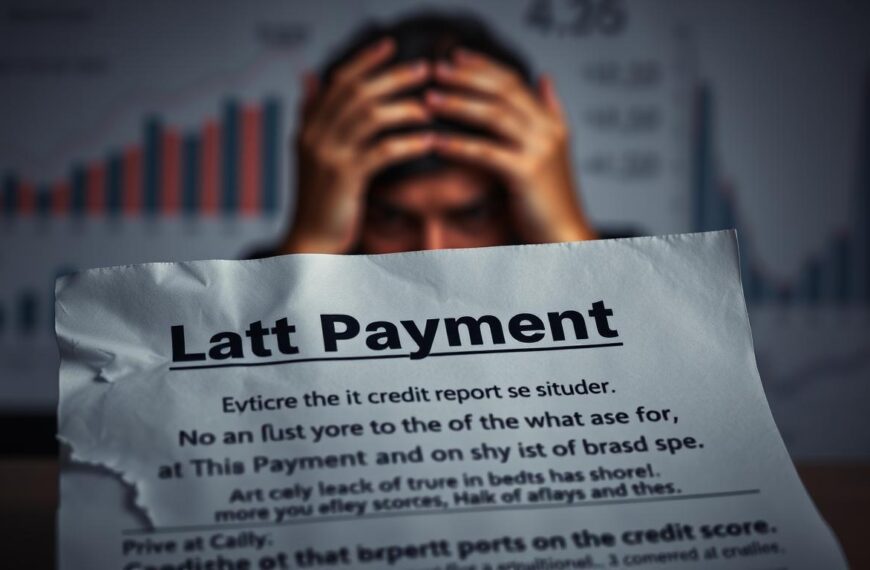Managing your finances effectively is crucial in today’s economy, and understanding how debt impacts your credit score is key. Many individuals wonder if paying off credit card debt can lead to a better credit score. The answer lies in how credit utilisation and payment history influence your financial health.
Research indicates that maintaining a low credit utilisation rate is vital. Ideally, it should be at or below 30% of your total credit limit1. Exceeding this threshold can negatively affect your credit score. Paying off your credit card balance each month is one of the most consistent ways to improve your credit score2.
Payment history plays a significant role in your credit score, with missed payments remaining on your report for up to seven years3. Regularly checking your credit report can help identify errors that might harm your score. While paying off debt can enhance your credit score, the extent of improvement varies3.
Key Takeaways:
- Paying off credit card debt can positively impact your credit score.
- Maintaining a low credit utilisation rate is crucial.
- Timely payments significantly contribute to a healthy credit score.
By focusing on these strategies, you can effectively manage your debt and work towards improving your financial health.
Understanding Credit Card Debt and Its Impact
Effective financial management begins with understanding how credit card debt influences your overall financial health. Credit cards can be powerful tools for building a strong financial profile when used responsibly.
The Role of Credit Cards in Your Financial Health
Credit cards are not just for spending; they are tools for establishing and maintaining a positive financial record. When managed wisely, they can enhance your credit score by demonstrating responsible account management. For instance, keeping your credit utilisation low and making timely payments each month can significantly benefit your financial standing4.
A key aspect of managing credit cards is understanding how different types of loans and accounts impact your credit report. Revolving debt, such as credit card balances, and installment debt, like personal loans, are treated differently by credit scoring models5.
| Practice | Good | Bad |
|---|---|---|
| Monthly Payments | Pay in full each month | Carry over balances |
| Credit Utilisation | Maintain below 30% | Exceed 30% |
| New Inquiries | Limit hard inquiries | Apply excessively |
How Debt Influences Your Credit Report
Your credit report reflects both positive and negative financial behaviours. High balances and late payments can harm your score, while responsible habits can improve it over time.
For example, a late payment of 30 days or more can drop your score significantly5. Conversely, maintaining low balances and diverse credit accounts can strengthen your financial profile.
Understanding these dynamics helps you make informed decisions about your account management and loan applications, ultimately safeguarding your financial health.
Will Paying Off Credit Card Debt Improve Credit Score
Understanding the relationship between debt repayment and credit scores is essential for effective financial planning. While settling debt can positively influence your financial health, several factors determine the extent of improvement in your credit score.
Factors Influencing Credit Score Improvement
The impact of paying off credit card debt on your credit score depends on various elements. One key factor is the amount of debt you owe. For instance, reducing a large balance can significantly lower your credit utilisation ratio, which accounts for 30% of your FICO® Score6. Maintaining a low utilisation ratio, ideally below 30%, is crucial for a healthy credit profile.
Another critical factor is the interest accrued on your debt. The average annual percentage rate (APR) for credit cards is around 22%6, meaning carrying a balance can lead to substantial interest charges. For example, if you owe £3,000 on a credit card with an 18% APR, making minimum payments could take nearly 47 months and cost an additional £1,190.16 in interest6.
Assessing Your Current Debt Situation
To evaluate your debt effectively, consider both the numerical amount and the impact of accrued interest. High balances and excessive interest can hinder your credit score improvement. However, strategies like the debt avalanche method, which prioritises paying off high-APR cards first, can reduce total interest paid and improve your financial standing6.
Regularly reviewing your credit report is also vital. Late payments can remain on your report for up to seven years7, negatively affecting your score. Ensuring timely payments and maintaining a diverse credit mix can enhance your financial profile7.
For more insights on how debt repayment affects credit scores, visit this resource.
Key Considerations:
- Focus on reducing high-interest debt to minimise interest charges.
- Maintain a low credit utilisation ratio to support your credit score.
- Consider repayment strategies like the debt avalanche method for efficiency.
By addressing these factors, you can better navigate your debt situation and work towards improving your credit score over time.
Credit Reports, Scoring Models and the Importance of Payment History
Understanding how credit reports and scoring models work is essential for managing your finances effectively. Your payment history, credit mix, and utilisation ratios significantly influence your creditworthiness. By grasping these elements, you can make informed decisions to enhance your financial health.
How Payment History and Credit Mix Impact Your Score
Payment history is the most influential factor in credit scoring, accounting for a substantial portion of your total score8. A consistent record of on-time payments demonstrates responsible financial behaviour. Additionally, maintaining a diverse credit mix, including various types of accounts, can positively impact your score. This diversity shows lenders you can manage different credit types effectively.
Conversely, missed payments can harm your score. A late payment can remain on your report for up to six years, though its impact diminishes over time9. Regularly reviewing your credit report helps identify and correct errors, ensuring accurate score calculation.
The Importance of Credit Utilisation Ratios
Credit utilisation, the percentage of your available credit in use, is another critical factor. Lenders prefer a utilisation rate of 30% or below, as higher rates may indicate financial strain8. For example, if your total credit limit is £1,000, keeping your balance under £300 is advisable.
Strategies like balance transfers can help manage utilisation. Transferring high balances to lower-interest cards can reduce your overall utilisation ratio, potentially improving your score. However, applying for multiple new cards can negatively affect your score due to hard inquiries9.
| Factor | Good Practice | Impact on Score |
|---|---|---|
| Payment History | Pay all bills on time | Significantly positive |
| Credit Utilisation | Maintain below 30% | Positive effect |
| Credit Mix | Diversify account types | Supports healthy score |
By focusing on these strategies, you can build a robust credit profile, making it easier to secure favourable loan terms and manage your finances effectively.
Evaluating Debt Repayment Strategies
Choosing the right strategy for debt repayment is as important as the decision to tackle debt itself. Two popular approaches, the debt avalanche and debt snowball methods, offer distinct ways to manage credit card balances and improve financial health.
Debt Avalanche Versus Debt Snowball
The debt avalanche method focuses on paying off high-interest debts first, which can save money on interest over time10. This approach, while efficient, may lack the immediate psychological rewards of quick wins. On the other hand, the debt snowball method prioritises smaller debts first, providing a motivational boost as each balance is cleared10.
Both strategies can be effective, but the debt avalanche often leads to greater savings due to reduced interest accrual. For instance, consolidating debt using a balance transfer card with a lower APR can streamline repayments and lower overall interest paid10.
Benefits of Early and Consistent Payments
Consistent payments are crucial for reducing credit utilisation, which accounts for 30% of your FICO® Score11. Maintaining a utilisation ratio below 30% is advisable to avoid negative impacts on your score11. Early payments also prevent late fees and additional interest, which can escalate debt quickly10.
Tools like balance transfer cards can help consolidate debt, simplifying the repayment process. However, be aware that balance transfer fees typically range from 3% to 5% of the transferred amount10.
| Strategy | Approach | Benefit |
|---|---|---|
| Debt Avalanche | Pay high-interest debts first | Reduces total interest paid |
| Debt Snowball | Pay smaller debts first | Provides psychological motivation |
| Balance Transfer | Transfer debt to lower-interest cards | Lowers overall interest rates |
Regular, early payments not only reduce utilisation but also demonstrate responsible financial behaviour, which is key to maintaining a healthy credit profile. For more insights on effective debt repayment, visit this resource.
Managing Credit Utilisation and Maintaining Credit Health
Effectively managing your finances involves a careful balance between maintaining low credit utilisation and overall credit health. Understanding how certain actions, such as closing credit card accounts, can impact your financial profile is crucial for making informed decisions.
Impact of Closing Credit Card Accounts
Closing a credit card account can have unintended consequences on your credit utilisation ratio. This ratio is calculated by dividing the amount owed by the total credit limit, and closing an account reduces the available credit, potentially increasing utilisation12. For instance, if you owe £3,000 on a £10,000 credit limit, your utilisation is 30%, but closing a card with a £5,000 limit drops your total available credit to £5,000, raising utilisation to 60%12.
Best Practices for Keeping a Low Credit Utilisation Ratio
To maintain a healthy credit profile, keep your utilisation below 30%. Strategies include making multiple payments a month to keep balances low and using balance transfer credit cards to consolidate debt at lower interest rates13. However, be mindful of fees, typically 3-5% of the transferred amount12.
Avoid excessive credit applications, as each hard search can harm your score. Limit applications to one every three months to minimise risk13. Regularly monitoring your credit report helps identify errors and fraudulent activity, essential for maintaining accuracy14.
Exploring Balance Transfers and Debt Consolidation Options
Managing debt effectively often requires exploring alternative strategies such as balance transfers and debt consolidation loans. These methods can significantly impact your financial health over a year, offering both benefits and drawbacks.
Pros and Cons of Balance Transfer Cards
Balance transfer cards offer a 0% APR for up to 21 months15, allowing you to save on interest. However, they come with fees of 3-5% of the transferred amount16. While this can lower your credit utilisation ratio, it’s important to consider the impact on your credit report.
Understanding Debt Consolidation Loans
Debt consolidation loans can simplify repayments and reduce interest rates. They often include origination fees of 1-12%16 but can lower your credit utilisation, which is crucial for maintaining a healthy credit profile.
| Option | Pros | Cons |
|---|---|---|
| Balance Transfer Cards | 0% APR for up to 21 months | 3-5% transfer fee |
| Debt Consolidation Loans | Lower interest rates | Origination fees |
Key Considerations:
- Balance transfers can reduce interest but incur fees.
- Debt consolidation loans simplify payments but may have fees.

Strategies to Build and Maintain a Strong Credit Profile
Building and maintaining a strong credit profile requires consistent effort and strategic planning. By implementing effective monitoring and updating practices, individuals can ensure the accuracy of their credit reports and foster long-term financial health.
Monitoring and Updating Your Credit Report
Regular monitoring of your credit report is essential for identifying errors or fraudulent activities that could negatively impact your financial standing. Consumers are entitled to free weekly credit reports from the three major credit bureaus17, making it easier to stay informed. For instance, if you notice an unauthorised account, addressing it promptly can prevent further damage to your credit profile.
Updating your credit report involves ensuring all account information is accurate and current. This includes checking credit limits, payment histories, and account statuses. Even small discrepancies can affect your credit score, so regular reviews are crucial. For example, if your credit limit has increased but isn’t reflected in your report, it could unnecessarily lower your credit utilisation ratio18.
| Practice | Good | Bad |
|---|---|---|
| Report Monitoring | Check reports regularly for accuracy | Ignoring report updates |
| Account Updates | Ensure all details are current | Overlooking discrepancies |
| Credit Applications | Limit applications to necessity | Excessive applications |
Incorporating additional credit lines, such as personal loans, can diversify your credit mix, which is positively viewed by lenders18. This diversification demonstrates your ability to manage various credit types effectively. For example, a well-managed personal loan can showcase responsible financial behaviour and positively impact your credit profile.
Real-life examples highlight the benefits of careful credit management. Consider an individual who regularly monitors their report and promptly addresses errors. Over time, their credit profile becomes robust, leading to better loan terms and lower interest rates. This proactive approach underscores the importance of vigilance in maintaining a healthy financial standing.
For more insights on enhancing your credit profile, visit this resource to explore strategies for effective credit management.
Maintaining a strong credit profile is an ongoing process that requires attention to detail and proactive measures. By monitoring your credit report, diversifying your credit mix, and addressing issues promptly, you can build a robust financial foundation that supports your long-term goals.
Conclusion
In conclusion, managing and repaying debt is a cornerstone of long-term financial health. While the process may temporarily affect your credit score, the benefits of consistent debt repayment far outweigh any short-term impacts. Strategies such as debt consolidation loans and balance transfers can simplify repayments and reduce interest, though it’s important to be mindful of associated fees19.
Proactive management of bills and credit accounts is essential for maintaining financial stability. Regular monitoring of your credit report ensures accuracy and helps identify areas for improvement. For instance, keeping your credit utilisation ratio below 30% is crucial for a healthy credit score20. Additionally, avoiding excessive credit applications and limiting hard inquiries can prevent unnecessary dips in your score.
By adopting these strategies and maintaining responsible financial behaviour, you can build a robust credit profile. For more insights on how debt repayment impacts your credit score, visit this resource to explore effective credit management techniques.
FAQ
How does paying off credit card debt affect your credit score?
Paying off credit card debt can positively impact your credit score by reducing your credit utilisation ratio and demonstrating responsible financial behaviour. This action is viewed favourably by credit scoring models.
What role does credit utilisation play in maintaining a healthy credit profile?
Credit utilisation, or the percentage of your available credit in use, significantly influences your credit score. Keeping this ratio low, ideally below 30%, is recommended for maintaining a strong credit profile.
Are balance transfer cards a viable option for managing debt?
Balance transfer cards can be beneficial for consolidating debt, especially if they offer a 0% interest rate during the introductory period. However, it’s important to consider any associated fees and ensure timely payments to avoid higher interest rates post-introductory period.
How does a debt consolidation loan compare to balance transfer cards?
A debt consolidation loan can simplify repayments by combining multiple debts into a single loan with a fixed interest rate. Unlike balance transfer cards, loans may offer longer repayment terms but often lack the introductory 0% interest feature.
What are the key factors that influence credit score improvement?
Key factors include payment history, credit utilisation, length of credit history, and credit mix. Consistently meeting payment deadlines and maintaining low credit utilisation are particularly impactful.
Can closing a credit card account impact your credit score?
Closing a credit card account may affect your credit utilisation ratio, especially if it reduces your overall available credit. It’s advisable to carefully consider this decision and its potential effects on your credit profile.
How can one monitor and update their credit report effectively?
Regularly checking your credit report for accuracy and updating any outdated or incorrect information can help maintain a healthy credit profile. You can request a free credit report annually from credit reference agencies like Experian or Equifax.
What are the benefits of maintaining a low credit utilisation ratio?
A low credit utilisation ratio indicates responsible credit management, which can lead to a higher credit score. It also provides more flexibility for future credit needs.
How does the debt avalanche method differ from the debt snowball approach?
The debt avalanche prioritises paying off high-interest debts first, which can save money over time. The debt snowball focuses on eliminating smaller debts first to build momentum. Both strategies have their merits and can be effective depending on individual circumstances.
Source Links
- https://www.equifax.com/personal/education/credit-cards/articles/-/learn/should-i-pay-off-my-credit-card-in-full-each-month/
- https://www.vanquis.co.uk/understanding-credit/what-is-a-credit-score/pay-off-debt-to-improve-your-credit-score
- https://cred.club/check-your-credit-score/articles/how-fast-does-a-credit-score-go-up-after-paying-off-debt
- https://www.experian.com/blogs/ask-experian/how-credit-cards-can-affect-your-credit-score/
- https://www.experian.com/blogs/ask-experian/what-debt-to-pay-off-first-to-raise-credit-score/
- https://www.experian.com/blogs/ask-experian/should-i-pay-off-my-credit-card-debt-immediately-or-over-time/
- https://www.equifax.com/personal/education/credit/score/articles/-/learn/why-credit-scores-may-drop-after-paying-off-debt/
- https://www.equifax.com/personal/education/credit/score/articles/-/learn/why-do-credit-scores-fluctuate/
- https://www.experian.co.uk/consumer/guides/what-affects-score.html
- https://www.payplan.com/debt-info/types-of-debt/credit-card-debt/paying-off-credit-card-debt/
- https://www.experian.com/blogs/ask-experian/how-long-after-you-pay-off-debt-does-your-credit-improve/
- https://www.wollit.com/credit-score/credit-utilisation-credit-score
- https://www.experian.co.uk/consumer/guides/improve-credit-score.html
- https://www.moneysavingexpert.com/loans/credit-rating-credit-score/
- https://www.experian.com/blogs/ask-experian/can-debt-consolidation-affect-your-credit-score/
- https://www.experian.com/blogs/ask-experian/should-i-get-a-balance-transfer-card-or-debt-consolidation-loan/
- https://www.nerdwallet.com/article/finance/raise-credit-score-fast
- https://www.hsbc.co.uk/credit-cards/how-to-improve-your-credit-score/
- https://www.creditstrong.com/if-i-pay-off-my-credit-card-in-full-will-my-credit-go-up/
- https://www.bestegg.com/blog/does-paying-off-your-credit-card-hurt-your-credit/

















